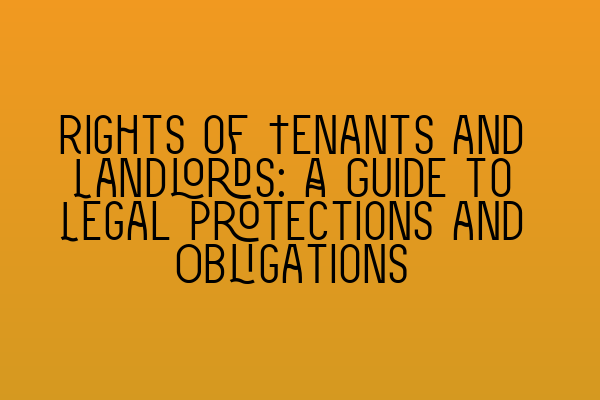Rights of Tenants and Landlords: A Guide to Legal Protections and Obligations
When it comes to the relationship between tenants and landlords, it is crucial to understand the legal protections and obligations that apply to both parties. Whether you are a tenant renting a property or a landlord letting it out, being aware of your rights and responsibilities is essential for a harmonious and lawful tenancy. In this comprehensive guide, we will explore the key legal aspects that govern the rights and obligations of tenants and landlords.
Tenants’ Rights
Right to a Habitable Property
As a tenant, you have the right to a safe and habitable property that meets certain standards. This means that the property must be fit for habitation, with working utilities, proper sanitation, and sufficient heating, among other requirements. If the property falls below the necessary standards, you have the right to request repairs or improvements from your landlord.
It is essential to thoroughly inspect the property before signing the tenancy agreement. Take note of any existing damages or issues and ensure they are addressed by the landlord before moving in. By doing so, you protect yourself from being held responsible for pre-existing problems.
However, it is important to remember that you are also responsible for taking reasonable care of the property. Any damages caused by neglect or intentional actions may be your responsibility to repair or compensate for at the end of the tenancy.
Right to Fair Rent
As a tenant, you have the right to pay a fair and reasonable rent for the property you are renting. This means that the rent should be in line with market rates and should not be increased unreasonably during your tenancy. Your tenancy agreement should clearly state the rent amount, the frequency of payment, and any applicable terms and conditions.
If you believe that your rent is significantly higher than the market value or if you suspect your landlord is increasing the rent unfairly, you have the right to challenge the increase. Seek legal advice in such situations to understand your options and rights.
Right to Privacy
Tenants have the right to privacy and peaceful enjoyment of their rented property. Your landlord must obtain your permission and give reasonable notice before entering the property, except in cases where there is an emergency or as stated in the tenancy agreement. Your landlord should respect your privacy and not interfere with your use of the property without proper justification.
If you feel that your privacy rights are being violated by your landlord, document the incidents and seek legal advice to understand the appropriate steps to take.
Landlords’ Obligations
Obligation to Provide a Habitable Property
Landlords have a legal obligation to provide tenants with a safe and habitable property. This means ensuring that the property meets all necessary standards and regulations, such as having proper ventilation, functioning utilities, and adequate fire safety measures. It is the landlord’s responsibility to address any repairs or maintenance issues promptly to ensure the property remains habitable.
Failure to comply with these obligations may result in legal consequences, such as fines or being held liable for any damages or injuries that occur as a result of the landlord’s negligence.
Obligation to Maintain Security Deposits
When renting out a property, landlords commonly require tenants to provide a security deposit. The landlord has a legal obligation to handle this deposit appropriately. It should be held in a protected scheme and returned to the tenant at the end of the tenancy, minus any deductions for damages or outstanding rent.
It is crucial for landlords to provide tenants with written information about the deposit scheme being used and the prescribed information required by law. Failure to comply with these obligations may result in financial penalties and may affect the landlord’s ability to regain possession of the property in the future.
Conclusion
Understanding the rights and obligations of tenants and landlords is vital for a successful and lawful tenancy. As a tenant, it is important to protect your right to a habitable property, fair rent, and privacy. Landlords must fulfill their obligations to provide a safe and habitable property, maintain security deposits appropriately, and respect the privacy rights of their tenants.
If you have any concerns or questions about your rights as a tenant or obligations as a landlord, it is advisable to seek legal advice from a property law expert. They can provide guidance based on your specific circumstances and help you navigate the complexities of tenancy laws.
For further information on other aspects of property law and contract law, we recommend you to check out our related articles:
- SQE Contract Law: Analyzing Landmark Cases and Influential Judicial Decisions
- Understanding Contractual Capacity: Rights and Limitations
- Interactive SQE Mock Tests for Contract Law: Test Your Knowledge
- Join Our SQE Contract Law Webinars: Expert Insights and Guidance
- SQE Prep: Mastering the Essentials of Contract Law
